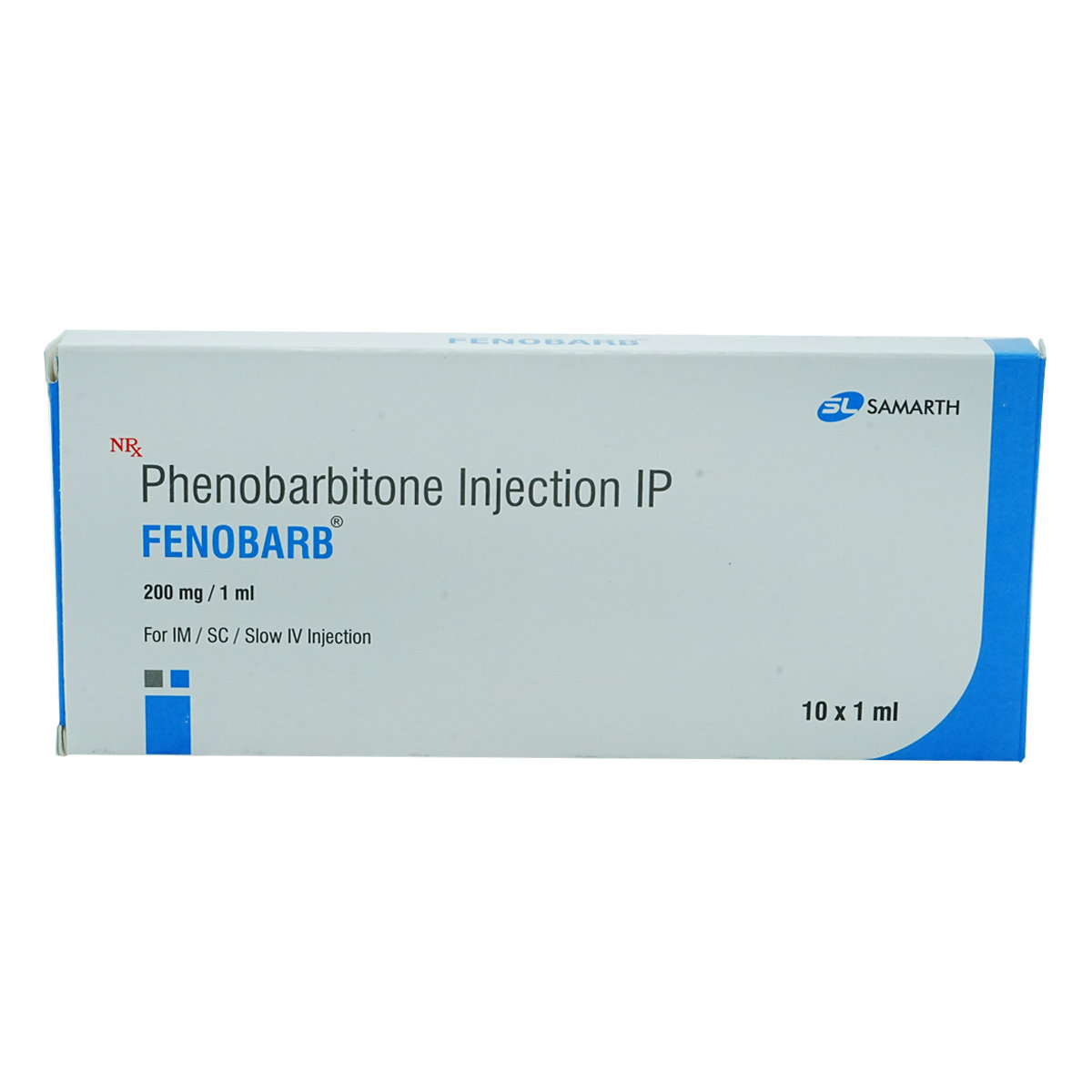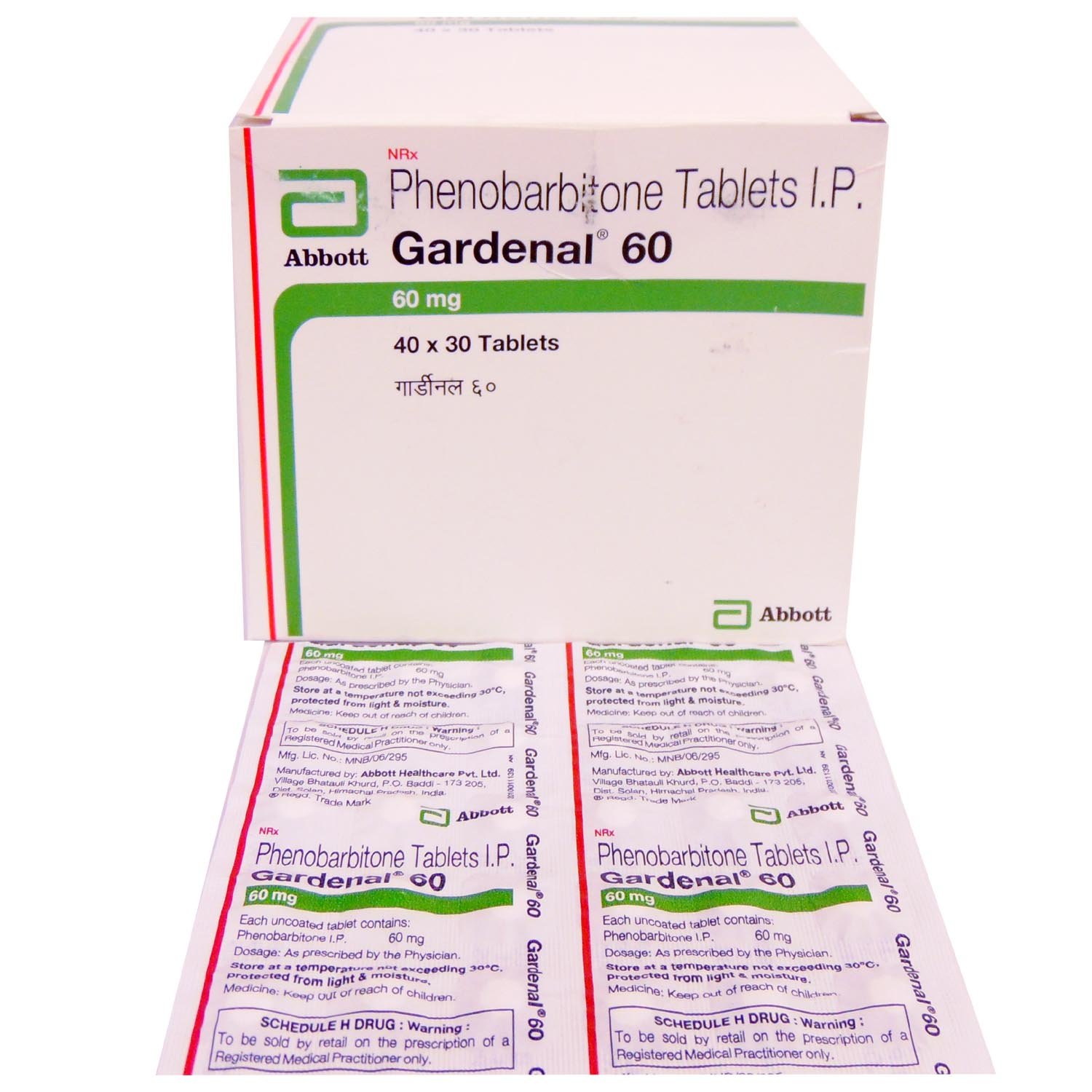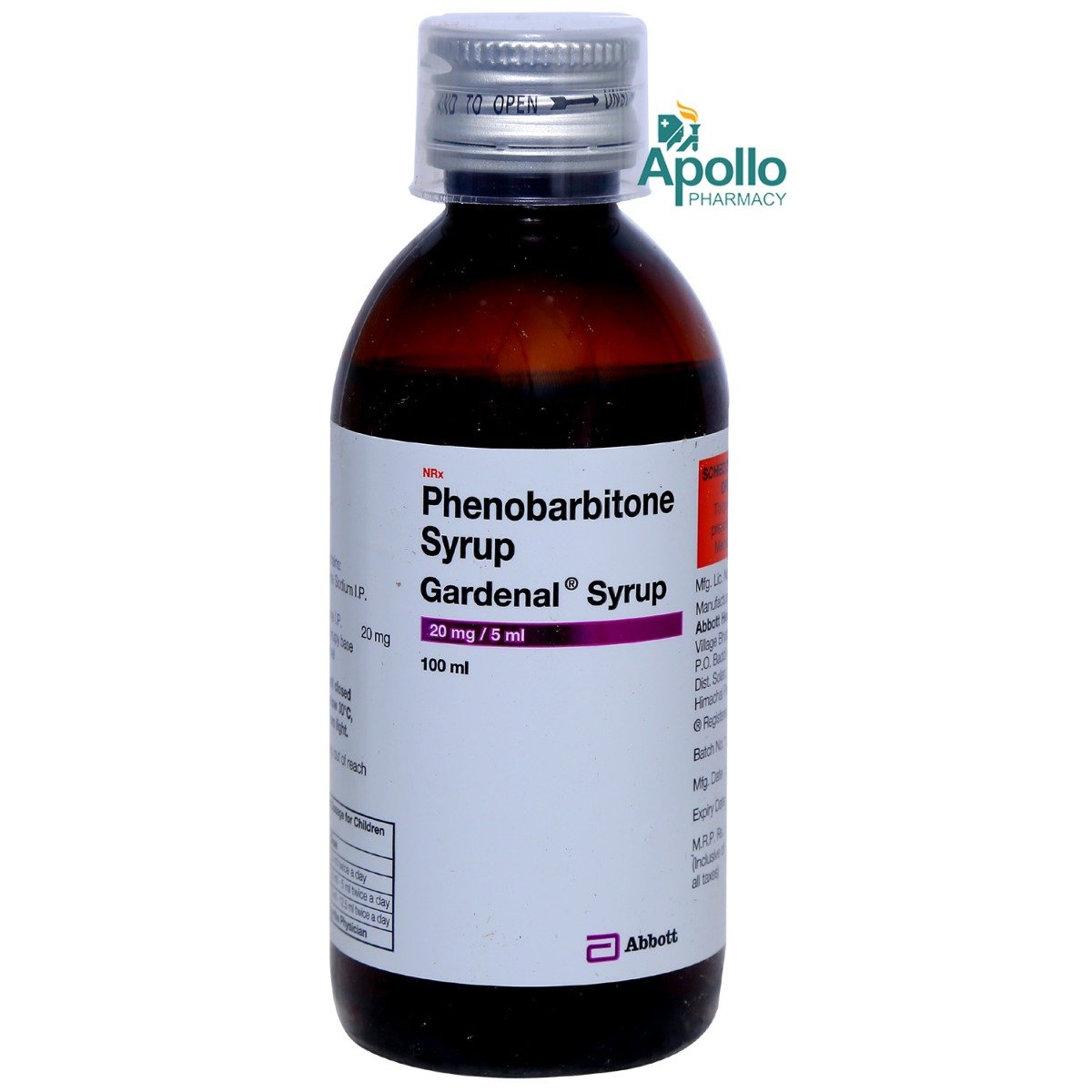Phenobarbitone
About Phenobarbitone
Phenobarbitone belongs to the class of medicines known as 'anti-convulsant drugs', indicated in the treatment of epilepsy and the symptoms associated with it, like seizures. Epilepsy is a neurological disorder in which nerves present in the brain fail to function properly, resulting in seizures, sensations, unusual behaviour, and even sometimes loss of consciousness.
Phenobarbitone consists of Phenobarbital, which works by controlling the abnormal electrical activity in the brain, thereby preventing and controlling seizures. Additionally, it calms down the excited chemicals of the brain and makes a person relaxed so that the brain can function properly.
Take Phenobarbitone as prescribed. Phenobarbitone is usually recommended to take before bedtime so that a person can sleep well and the medicine can work effectively. Your doctor will recommend how often you take Phenobarbitone based on your medical condition. Some patients taking Phenobarbitone may experience unpleasant effects of this medicine that include drowsiness, lethargy, residual sedation, vomiting, and headache. Most of these side effects of Phenobarbitone do not require medical attention and gradually resolve over time. However, if the side effects persist or worsen, please consult your doctor.
Do not increase or decrease the dosing strength of the medicine, as the doctor may initially advise a lower dose of this medicine and then gradually increase the dose to prevent the chances of adverse reactions, including dizziness and drowsiness. This medicine should be used with caution in patients with liver disease, chronic pain, pituitary gland disorder, and pheochromocytoma. Persons who are allergic to Phenobarbitone or any of its constituents, or are taking a blood thinner (such as warfarin) are not allowed to take this medicine.
Uses of Phenobarbitone
• Seizure Control: Phenobarbitone is commonly prescribed to manage and treat various types of seizures, particularly in patients with epilepsy.
• Anxiety Relief: Phenobarbitone is used for short-term relief of anxiety, especially when a quick effect is required.
• Sleep Disorders: Phenobarbitone acts as a sedative and may help address insomnia or other sleep-related disorders due to its calming properties.
• Neurological Conditions: Phenobarbitone may be utilized in the symptomatic treatment of certain neurological disorders.
• Alcohol Withdrawal: Phenobarbitone is included in the treatment plans to assist individuals experiencing withdrawal symptoms from alcohol or barbiturates.
Medicinal Benefits
Phenobarbitone belongs to a group of medications known as anticonvulsants that are used for the treatment of all types of epilepsy except absence seizures. This medicine works by controlling the abnormal electrical activity of the brain that causes seizures. Additionally, it also calms down the exciting chemicals of the brain so that a person feels relaxed. By controlling seizures, Phenobarbitone allows a person to do daily activities and also reduces the risk of unconsciousness and repeated seizures.
Directions for Use
- Phenobarbitone can be taken with or without food, as advised by a doctor.
- Your doctor will determine the dosage and timing of this medication based on your medical condition.
- Swallow Phenobarbitone as a whole with a glass of water.
- Do not crush, chew, or break it.
Storage
Side Effects of Phenobarbitone
- Excitation
- Headache
- Tiredness
- Dizziness
- Vomiting
- Drowsiness
Medicines Containing this Salt
View AllDrug Warnings
Phenobarbitone is not recommended in patients with severe asthma or COPD, severe liver disease, porphyria, or a history of addiction to phenobarbital. Follow the doctor's advice if you are taking this medication in pregnancy, as seizure control is important during pregnancy. Inform your doctor if you are planning to be pregnant or are pregnant. This is a habit-forming medicine, so never advise it to anyone. Never start or stop taking this drug without asking the doctor. If a person stops taking it without asking the doctor, then they could face withdrawal symptoms like hallucinations, twitching, anxiety, and trouble sleeping. Therefore, the dosage should be reduced gradually before being stopped completely.
Drug Interactions
Drug-Drug Interaction: Some of the medications that can interact with Phenobarbitone include anti-inflammatory medications (Aspirin), opioid medications (codeine, hydrocodone, methadone, buprenorphine/naloxone, tramadol), antiepileptics (oxcarbazepine, phenytoin, and sodium valproate), antipsychotics (chlorpromazine), and vitamins (folic acid). This is not a complete list of drug interactions, so tell your doctor about every drug, herbal, and non-herbal product you are using.
Drug-Food Interaction: Phenobarbitone may interact with alcohol and can cause serious addiction effects, so one should not consume alcohol.
Drug-Disease Interaction: The use of the Phenobarbitone is restricted in medical conditions, including acute intermittent porphyria, severe respiratory depression, and severe renal or hepatic impairment.
Drug-Drug Interactions Checker List:
Safety Advice

Alcohol
unsafeBeing a barbiturate, Phenobarbitone is a habit-forming medicine and can cause dependence. The risk of dependence increases with alcohol use. Do not drink alcohol while taking Phenobarbitone to reduce this risk.

Pregnancy
safe if prescribedFollow all the directions given by your doctor if you are using Phenobarbitone during pregnancy, as controlling seizures is very important at this time. A seizure can harm both the mother and the unborn baby. Tell your doctor if you are pregnant; they will prescribe the correct dose for you.

Breast Feeding
safe if prescribedPhenobarbitone can only be given to breastfeeding mothers if strongly suggested by the doctor.

Driving
cautionPhenobarbitone may cause drowsiness, dizziness, and other symptoms that can affect a person's thinking ability; therefore, avoid engaging in such activities.

Liver
unsafePhenobarbitone can not be indicated in patients with severe liver disease. Please discuss with your doctor if you have any concerns.

Kidney
cautionPhenobarbitone can only be advised to patients dealing with kidney disorders if strongly suggested by a doctor.

Children
safe if prescribedPhenobarbitone is safe for children if prescribed by a doctor. Initially, the child feels sleepy, but soon the child will develop tolerance to the unpleasant effects of the medication.
Habit Forming
Diet & Lifestyle Advise
- The first thing a person should do is to quit smoking as smoking makes it difficult for Phenobarbitone to work correctly, increases the chances of epileptic attacks, and even damages the lungs. Better to quit it.
- Include vegetables and fruits in your diet that are rich in antioxidants and support brain health. This will prevent epileptic attacks.
- Set a sleep and wake-up time and aim for 7-8 hours of sleep.
- Fatigue is one of the primary reasons that trigger seizures in the body, so sleeping properly can help in relaxing the brain.
- Do not consume alcohol as it may raise the risk of epileptic attacks.
- Maintain your happiness and avoid taking emotional stress, as stress can trigger seizures. People who maintain healthy stress levels have reported that they have responded well to the medicine.
Patients Concern
Disease/Condition Glossary
Epilepsy: It is a chronic neurological disorder that is followed by repeated seizures. Usually, the neurons present in the brain generate electrical signals to communicate with each other. In epilepsy, these electrical signals get burst and imbalanced, which affects the consciousness, sensations, and movements of the body. Some of the factors that can increase the risk of seizure include stress, sleep deprivation, tiredness, and alcohol use. The common symptoms of epilepsy are changes in the sense of taste, touch, smell, sight, hearing, dizziness twitching of limbs.
FAQs
Phenobarbitone is used in the treatment of epilepsy and the symptoms associated with it, like seizures.
Phenobarbitone belongs to a class of medications known as barbiturate anticonvulsants/hypnotics. It works by controlling the abnormal electrical activity in the brain that occurs during a seizure. Additionally, it also calms down the exciting chemicals of the brain so that a person feels relaxed.
Yes, Phenobarbitone is a habit-forming medicine that can cause serious drug addiction so one should talk to their doctor before quitting it completely.
Being barbiturates, Phenobarbitone is a habit-forming medicine that can cause drug addiction in them. The dangers of addiction increase when combined with alcohol, so do not consume alcohol to get better results.
Phenobarbitone can be taken with or without food; however, there are chances of vomiting when taken on an empty stomach. It is better to take Phenobarbitone with one glass of milk or after meals to avoid stomach upset, as suggested by the doctor.
No, do not stop taking Phenobarbitone without confirming with the doctor, as it may worsen or cause a severe seizure. It is better to consult with the doctor, as they may be able to adjust the dosage before completely stopping it.
Phenobarbitone can take approximately 2 to 4 hours for its beneficial action to be noticeable in adults and remains in the body for 10 to 12 hours. It would be better to talk to the doctor for complete information.
If you forget to take a dose of Phenobarbitone, take it as soon as you remember; however, if it is almost time for the next scheduled dose, skip the missed dose and continue with your regular schedule. Continue with the regular dosing schedule. Do not take a double dose to make up for a forgotten dose.
Long-term side effects of Phenobarbitone are changes in the soft tissues of the body. Symptoms include joint pain, discomfort, or thickening in specific areas, such as the palms or soles of the feet. If you experience any of these symptoms, please consult your doctor.
Taking more than the recommended dose of Phenobarbitone can lead to an overdose. Overdose symptoms include drowsiness, speech problems, jerky movements, jerky eye movements, loss of inhibition, reduced reflex response, low body temperature, low blood pressure and breathing problems. If you experience any of these symptoms, please consult your doctor immediately.
Phenobarbitone is used in children to treat and prevent seizures. However, it can cause side effects such as nausea, vomiting, drowsiness, dizziness, and hyperactivity. It's important to monitor your child for any unusual symptoms and consult your doctor if you have any concerns.
No, do not take folic acid while taking Phenobarbitone. Because folic acid interacts with Phenobarbitone and may decrease the levels of Phenobarbitone in your body. Please consult your doctor if you have any concerns.
The duration for taking Phenobarbitone depends on your specific condition and your doctor's recommendations. However, the exact duration should be determined by your doctor based on your response to Phenobarbitone and any side effects you may experience. Therefore, it's essential to follow your doctor's instructions and do not stop taking Phenobarbitone without consulting your doctor.
Yes, there is a test called the phenobarbital test that measures the level of phenobarbital in your blood. If you feel excessively sleepy and experience tremors, balance issues, or double vision, inform your doctor and have your levels checked.
Yes, Phenobarbitone can cause withdrawal symptoms like hallucinations, twitching, anxiety, and trouble in sleeping. So dosage should be reduced gradually before stopping it completely. And also inform your doctor before stopping Phenobarbitone. However, if you experience any of these symptoms, please consult your doctor.
The common side effects of Phenobarbitone are drowsiness, lethargy, residual sedation, vomiting, and headache. If any of these side effects persist or worsen, please consult your doctor.









